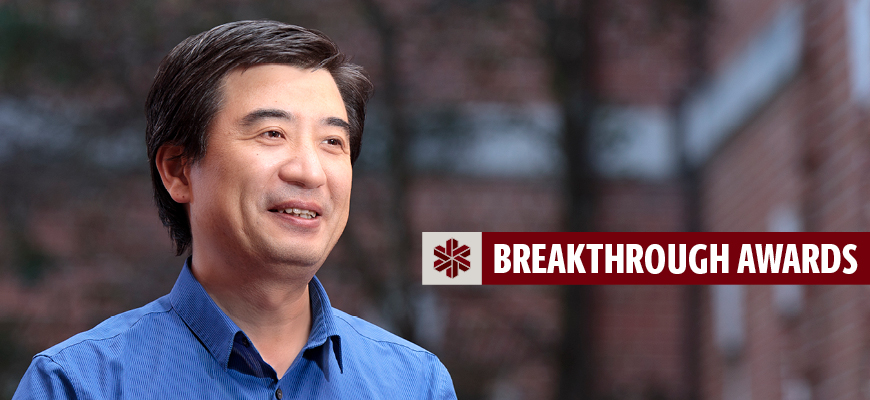
Breakthrough Star: Wenbin Tan
Medical school scientist focuses on rare birth defect
Posted on: July 7, 2022; Updated on: July 7, 2022
By Chris Horn, chorn@mailbox.sc.edu, 803-777-3687
It’s the unspoken fear of new parents — having a child born with a disfiguring birthmark that can mean a lifetime of medical procedures and emotional challenges.
Wenbin Tan, a professor of cell biology and anatomy at the University of South Carolina School of Medicine Columbia, has devoted much of his research to a congenital neurovascular malformation called Port Wine Stain, which appears as a reddish discoloration on the face or trunk of the body. About three to five infants in 1,000 are born with PWS, and of those affected, one in 100 have more serious underlying problems of vascular anomalies in the brain, such as Sturge-Weber Syndrome, and generally experience seizures or convulsions as well as mental deficiencies.
“At birth the vascular abnormality in the brain is often too small to be detected and brain MRI scans are not recommended for newborns, but a facial PWS at birth is an alarming indicator,” says Tan, who joined the cell biology and anatomy department of the medical school in 2018.
We’re excited about some of the data from the research because it points to possible treatments for our patients.
Wenbin Tan
Tan’s PWS research has been supported by the National Institutes of Health and is focused on better understanding the cause of the condition and devising more effective treatments. To that end, he has assembled a network of clinician partners to more effectively advance the research.
“My research collaborators at Prisma Health, MUSC and UC Irvine are leading physicians and plastic surgeons in the field; I want my research to be more clinically oriented rather than pure basic research,” Tan says.
While energy-based technology such as lasers remains the standard treatment for PWS, Tan’s research team is exploring potential new approaches by engineering exosomes, which are extracellular vesicles that can be used to target the cells involved in PWS. His lab has also developed a mouse model for PWS that will help scientists better understand the molecular underpinnings of the condition.
“We’re excited about some of the data from the research because it points to possible treatments for our patients,” Tan says. He’s particularly interested in development of a combined approach of certain pharmaceutical compounds with energy-based technology in treating vascular abnormalities such as PWS.
While PWS has been the long-term focus of Tan’s research, he nimbly mobilized his lab in the past two years to better understand the effects of COVID-19 on the cardiovascular system. He and his clinical partners first reported lipid abnormalities in COVID patients.
As part of that ongoing research, he has developed a model of the COVID-19 virus spike protein and investigated post-COVID-19 cardiovascular symptoms underlying obesity in an animal model, which has been awarded a pilot project grant from the NIH Center for Targeted Therapeutics program at the university.
Share this Story! Let friends in your social network know what you are reading about